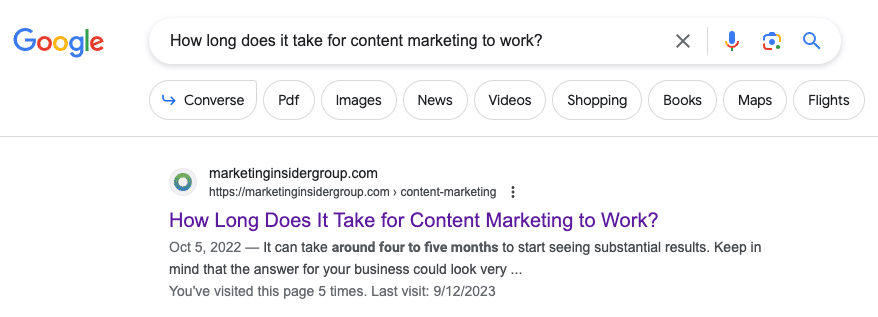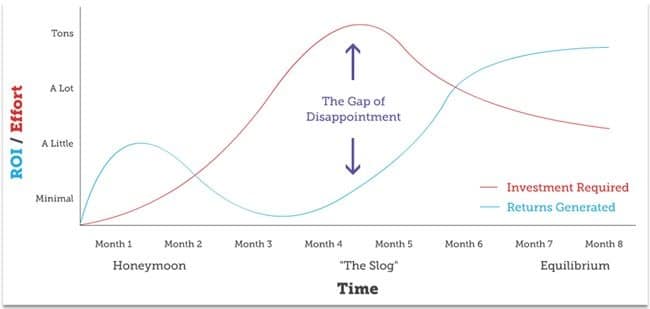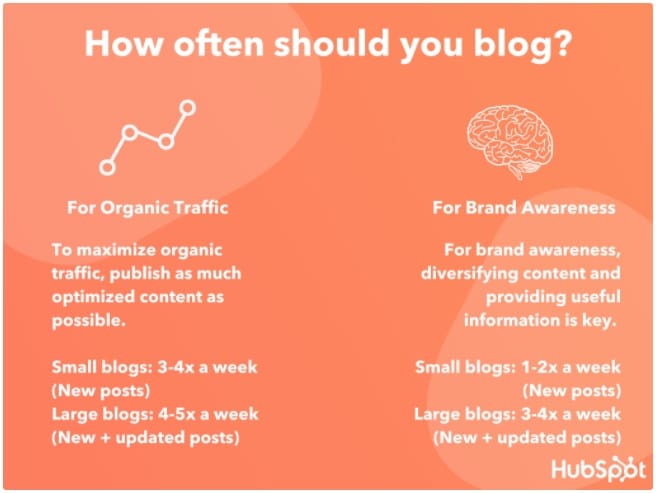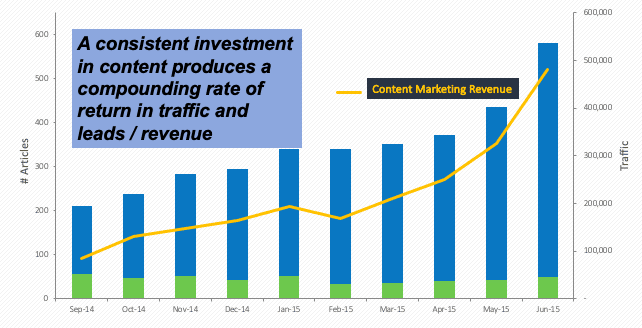
How Long Does It Take for Content Marketing to Actually Work?
A year ago, someone I know gave a keynote at one of the largest conferences in the industry and said that the one question no one answers that everyone wants to know is “how long does it take content marketing to work?” He said that “not even Michael Brenner has answered this question.”

Well as someone who loves to answer the biggest questions on the minds of my target audience, I am happy to report, that we now rank in the top 3 for this search result.

And yes, content marketing works. If you really want to know the short answer: Content Marketing takes around four to five months to start showing measurable results.
Keep in mind that the answer for your business could look very different. You might see Content Marketing ROI more quickly, depending on how much effort you put into strategy, production, and promotion.
Factors Impacting The Time It Takes For Content Marketing To Work
Conversely, it may take you much longer to see the same results based on your content output and focus. Content marketing is, by definition, an organic growth channel that is about earning trust with your audience. So your timeline will depend on these factors:
- Your content budget and the volume and consistency of the content you publish
- The competitiveness of your focus topics in your industry
- The quality and variety of the content you publish. So yeah, um, AI content isn’t gonna cut it.
- Whether you spend marketing dollars promoting your winners with contextual ads
So there it is: Content marketing does take some time to work. It’s a long-term strategy. If you want immediate results, you may not find them this way. You can go waste your money on paid ads. But if you want to build your business on a firm foundation of organic / inbound traffic and grow confidently into the future, content marketing is your best option.
Quick Takeaways:
- Every business will have different results based on efforts. How content marketing works for your business will depend on your budget and execution.
- Content marketing is a long-term strategy. It can be discouraging in the slow ramp up, but the results can be significant and compound over time.
- Consistently producing quality content is crucial to getting rapid time to value for your content marketing investment
How to Tell If Your Content Marketing Strategy is Working
Learn how to set your content marketing team up for success and measure your results to see how well your content marketing strategy works over time. Here’s a basic blueprint.
1. Define Success for Your Content Marketing Efforts
To know “if content marketing is working for you,” you first need to define what content marketing success looks like for your business.
Does success begin when you make the first dollar? Are your efforts successful once you meet a benchmark for traffic or leads? Is it when you make a certain number of sales? Number of shares on Facebook or LinkedIn? Engagement? Month-over-month growth?
If your efforts achieve the goals you set, your brand will be successful. But content marketing requires consistency.
As you can see from the chart above that includes 15 of our clients, content marketing shows an increase in leads and revenue almost right away! But the real growth starts around month 6. So when is the best time to start content marketing? Yesterday!
At SAP, it took us a year to achieve $1 million in sales. But the ROI was evident on day one when our sales team used the content to generate conversations with prospects!
Unfortunately, most B2B Content Marketing is composed of overly promotional and blatant promotion. Most marketers simply get it wrong because they think content marketing is about selling when it’s really supposed to be about educational thought leadership.
Here are some stats that prove the value of content marketing:
- Over 90% of B2B marketers and 86% of B2C marketers use Content Marketing
- Traditional marketing costs 62% more than Content Marketing
- Businesses that blog produce 67% more leads than those that don’t
So the success of your overall marketing efforts can be shown with content marketing because it generates better results for less money!
2. Use the Right Metrics
Before you begin setting goals and building content marketing strategies to grow your business, you must define your key performance indicators (KPIs). Make sure you choose the best metrics for your industry and business.
For example, your key metrics might include website traffic, email subscribers, and brand awareness if you’re a startup. If you’ve been in business for over ten years, you may want to focus on metrics like revenue and sales-qualified leads (SQLs).
We recommend including the following two metrics when building a Content Marketing plan, regardless of your business’s size or scope.
- Traffic: Traffic is the lifeblood of a website. Without consistently growing your traffic, your content marketing efforts will fall flat.
- Leads: Ultimately, the reason you’re driving traffic to your website is to generate interest and leads in your business or content.
But if you’re looking for a more detailed view, click here right now to download a FREE content marketing measurement template.
3. Research Your Target Audience and Create Buyer Personas
How will you build effective strategies if you don’t know who you’re targeting?
One of the first steps to building a solid content marketing plan is researching your audience. Develop reader personas to target your ideal consumers through your content.
Don’t create personas that have no actionability. When building personas, include things like:
- Basic demographics (age, gender, income, etc.)
- Background information (career, position, work history)
- Personality/unique traits
- Pain points/challenges
- How they search for answers (where they can find your business)
After researching online, conducting interviews for more insight, and learning where your target audience spends time online, you can form your reader personas and determine what types of content they’re seeking. This will play directly into your goal setting and marketing strategies.
4. Set SMART Goals
If you don’t set goals and define what “success” looks like for your business, you’ll never know if you’re getting desirable results from your content creation and marketing efforts. Before defining and implementing content marketing strategies, set some SMART goals for your business.
Use appropriate metrics for your industry and business, as we mentioned above. Semrush found that some of the top content marketing goals include generating more quality leads, attracting more traffic to the website, improving brand awareness, and improving customer loyalty and engagement.
Here are a few examples of what SMART goals for your business could resemble.
- Grow my newsletter subscription list by 500 contacts by June 1, 2023.
- Increase blog traffic to 10,000 monthly visitors by the end of Q1.
- Generate 100 marketing-qualified leads per month on average in Q2.
5. Analyze Results Regularly
You’ve started implementing your strategies, developing and publishing quality content, and working toward your SMART goals. Now you need to start tracking your results so you can see your progress. By measuring performance, you can see whether the initial goals you set are realistic or if you should adjust them for the next period.
Revisit your overarching goals every three to six months to ensure you’re on track. If you’ve exceeded your plans early, develop new ones to facilitate more remarkable growth moving forward.
Make sure you’re getting the feedback you need to know how effective your CM is working. You can email your contact list or send out a survey. Determine which tactics are helping you reach your SMART goals and which you should leave behind moving forward. Refresh your goals, adjust your strategies, and continue building momentum.
6. Be Patient and Consistent
Don’t rush the process or expect results prematurely. If you do, you’ll be disappointed and quit too early. It takes time for content to gain traction on search engines and your business brand to build authority and awareness online.

You may also see spikes and drops in traffic to your website. This is normal. Concentrate on the gradual and steady climb. Content marketing results grow exponentially, as opposed to linearly. What may seem like a slog at the beginning can turn into tangible progress and revenue over time.
Remember that content marketing is hard work. The top-performing articles online are long (over 3,000 words). But they get three times the traffic, four times the shares, and three-and-a-half times the backlinks of average-length articles (901-1200 words). That’s why many businesses outsource their content marketing – so they can focus on their business and leave the legwork to those who live and breathe SEO and content creation.
If you want results, you must put in the work. Invest in the right resources, and be patient – especially in the beginning. If you do, you should see sustainable and substantial results over time.
Effective content marketing will grow your online presence, boost brand awareness, drive traffic and sales, and increase revenue. Here are several additional benefits:
- Gain more traction on social media platforms
- Capture your target audience’s attention
- Build trust and loyalty
- Boost conversions
- Become a thought leader in your industry
- Build a foundation of quality, authoritative content to rank higher on SERPs
- Gain higher and sustained traffic and lead volume
8 Reasons Content Marketing Isn’t Working for Your Business
If you do not see the results you want, consider the following list of reasons content marketing doesn’t work for some businesses. You may resonate with one or more of them, which means there’s hope. Make strategic adjustments to improve your efforts and results moving forward.
1. Your Budget is Too Low
If you don’t invest enough time and resources into CM, you won’t see the results you want. A larger budget can afford higher quality content and quicker results. More succinctly, you get what you pay for.

Make sure you’re consistent, regardless of publishing frequency and budget. You can focus on less expensive tactics, like blogging and free social media promotion. Skip more expensive strategies like paid ads and video marketing until you can afford them.
Keep track of which efforts have the most significant ROI for your business, and then spend more of your budget there. Decide if outsourcing CM would be more efficient and cost-effective than trying to juggle all tasks in-house with limited resources – or hiring an expert to take it over.
While content marketing can be expensive, it can have a high return on investment. It generates around three times the number of leads per dollar spent as traditional marketing (Demand Metric).
2. You’re Not Producing the Right Types of Content
59% of B2B marketers believe blogs are the most valuable channel for content marketing. Companies that blog produce 67% more leads monthly than those that don’t (Demand Metric). However, it’s not the only viable or profitable option.
If you’re not already blogging, you should start. If you are, here are some other forms of content to consider adding to your marketing plan:
- Ebooks
- Pillar pages
- Video
- Infographics
- Case studies
- Guides
- Checklists
- White papers
- Podcasts
- Interviews
- Webinars
- Courses
- Slide decks
- Social media posts
- Testimonials and reviews
- Paid ad content
- User-generated content
3. You Aren’t Promoting Enough
Are you promoting your content after you create it? This step of the process is as critical as the creation process. Without promotion, you’ll have a hard time building engagement. Engagement leads to more traffic and higher rankings on search engines.
Start promoting your content on social media, in emails and newsletters, and on other websites or blogs when appropriate. Also consider working with influencers. Ask them to share your content with their audience and expand your reach. Just make sure you have the same target consumers.
4. Content is Low Quality or Doesn’t Provide Value
Does your content engage your target audience? Does it address their specific needs and provide value?
To be considered high quality, your content must be relevant, engaging, and well written. It also must demonstrate authoritativeness, expertise, and trustworthiness on the given topic (Google). It should encourage your readers to act – like to fill out a form or download a PDF.
If your content isn’t providing the right value to readers, it’s insufficient. If any of these statements are true, your content may be of low quality.
- Your content is dull when it should be engaging.
- Your writers don’t understand your market or buyer personas.
- The content you’re producing doesn’t connect with or excite your ideal audience.
- Your writers are inexperienced. Shoddy work will produce shoddy results.
- Your content is vague or too broad rather than focused. It doesn’t have depth.
5. You Don’t Publish Consistently
We’ve already touched on this. The more frequently you can produce quality content your audience loves, the better and faster your results will be. Ensure consistency long term to build confidence with your followers. Commit to a plan you can fulfill.
6. SEO Isn’t a Priority
Are you doing keyword research and tracking your progress? Are you optimizing every new piece of content for search engines? Are you keeping old content updated so that your website stays fresh and timely? If not, you won’t succeed.
If you need help with SEO, hire an expert consultant or marketing agency. They can conduct an audit to identify SEO gaps or weaknesses and tell you how to fix them (or fix them for you).
7. The Landscape is Extremely Competitive
If you’re in a niche with steep competition, it may take longer to rank on search engines and attract the traffic you want. Here are a few tips for staying in the game if you’re in an aggressive industry:
- Keep producing consistent, quality content.
- Conduct content gap analysis and fill those gaps.
- Go more in-depth than your competitors.
- Target a more specific audience and treat them like royalty to build a raving fanbase.
To compete with much larger and more established competitors, you must be strategic, work hard, and build a devoted following.
8. You’ve Set the Wrong Expectations
If your expectations are too high, you’ll never be satisfied – even with stellar results. Don’t compare your results to other businesses or your competitors. You’ll get discouraged if you can’t reach your goals.
Instead, compare your results with how you performed this time last year or even six months ago. If you haven’t been producing consistent content that long, give it more time to gain traction.
We Can Make Content Marketing Work for Your Business
Marketing Insider Group is a content marketing agency and business thought leader. We exist to deliver strategy, ROI, content creation, branding, coaching, and more for our clients. We designed our Content Builder Service to craft custom content marketing strategies to help businesses win new customers fast.
MIG will do all the legwork for you. We’ll devise a content plan, implement crucial strategies, and help you reach your SMART goals. We’ll craft quality content that draws in the right traffic and converts leads. You can focus on growing your business.
Learn more about our Content Builder Services.





![AI vs. Human Content: What Actually Gets You Results? [Research Report]](https://marketinginsidergroup.com/wp-content/uploads/2023/11/AI-vs.-Human-Content0.png)


